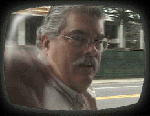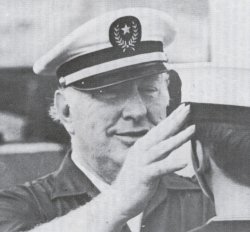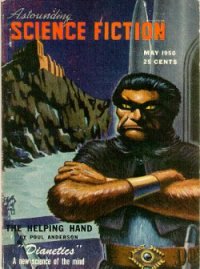CCHR - Human Rights Organization Attacks Its "Enemies"
|
CONTENT |
||||||||||||||||||||||||||||||||
| "I think psychiatry should be outlawed." [Tom Cruise, Scientologist, on MSNBC 1/21/04] OVERVIEWThe Church of Scientology has taken upon itself the goal
of eradicating psychiatry from the face of the earth. This
may seem like a strange project for a "church," until one
reads the thoughts of Scientology's founder, L. Ron Hubbard. |
||||||||||||||||||||||||||||||||
HISTORYL. Ron Hubbard was a science-fiction writer before he
started Dianetics (1950) and Scientology (1953). In 1940
he wrote "The Indigestible Tritan." In a forward to this
fictional work, he wrote about psychiatry, stating "the
fact that psychiatry has succeeded in healing but a small
percentage of the known ills of mind rather indicates that
the subject is not, as yet, ready for its place among the
sciences for all its brave effort to style itself." Hubbard
bemoaned that psychiatrists would ignore unusual cases as
simply "delusional," and that "every pioneer of knowledge
has been judged 'insane' in the initial stages of his work."
[Unknown Magazine, April, 1940 vol. 3, #2 "The Indigestible
Triton" by Renee Lafayette (a pen-name of Hubbard's)]
The next year, Hubbard was promoting his invention Dianetics. This was Hubbard's unscientific method of handling mental problems. In 1950 Hubbard published the book Dianetics: The Modern Science of Mental Health. While the methods were an alternative to psychiatry, they could be used by psychiatry:
Hubbard that same year in a lecture noted that a dianeticist should not be working on a psychotic "without liaison with some properly authorized gentleman of the medical profession, and without having a sanitarium close to hand..." [R & D vol. 2, page 167 1980 edition] But also in 1950, the American Psychological Association wrote to its members that they should refrain from using Dianetics:
|
|
|||||||||||||||||||||||||||||||
|
Hubbard had hoped that psychiatry would see the validity of his theories and embrace Dianetics, but instead the opposite happened. By 1955 Hubbard was writing in scathing terms about psychiatry:
Also in 1955 Scientology chose to attack the Alaska Mental Health Act. Alaska at the time was not yet a state and was sending its mental patients to Oregon for lack of their own facilities. A bill was proposed in the US congress to provide funds to create and maintain psychiatric facilities in Alaska. One million acres would be set aside to provide future funding for treatment. Hubbard received a telex about this bill from a Scientologist asking for instructions on what action to take:
Even though the majority of Alaskans, churches, and mental
health professionals approved of the bill, Hubbard launched
an attack to kill it, claiming that the bill would create
a concentration camp, or a Siberia, in Alaska, and that
any psychiatrist could ship whomever he or she wanted to
the encampment.
By 1964 Hubbard was accusing psychiatrists of being murderers:
Hubbard continued on with his attacks on psychiatry, blaming them for more and more of the universe's ills:
In 1969 the Citizen's Commission on Human Rights was
founded by Scientology to expose the evils of psychiatry.
This commission still works on this goal (www.cchr.org).
Hubbard ordered that "we assign any case or upset in Scientology to past damaged and interference with the person by medicine and psychiatry" [HCOP of 29 June 1971, "CONFIDENTIAL"] and eventually called for the complete eradication of psychiatry:
Hubbard's shrillness kept expanding until he was declaring that all of society's ills throughout history are caused by psychiatry:
L. Ron Hubbard died in January of 1986. He left behind his anti-psychiatric rants that the Church of Scientology and the Citizens Commission on Human Rights continue to obey as scripture. SCIENTOLOGY CONTINUES THE ATTACKIn 1994 CCHR sponsored a book titled "Psychiatrists: the Men Behind Hitler." This laughable treatise states that:
|
|
|||||||||||||||||||||||||||||||
|
The book's major thesis is that psychiatry caused the holocaust by giving Hitler and his henchmen the necessary foundation for their actions.
This psychiatric influence still exists today, and has its tentacles all over the world:
And here as well, the call for eradicating psychiatry rings through:
Meanwhile, CCHR continues this drumbeat to destroy psychiatry:
Even Scientology's own CIA, the Office of Special Affairs, got in on the act:
At one point CCHR tried to be magnanimous and give psychiatrists an out:
|
|
|||||||||||||||||||||||||||||||
|
David Miscavige, current head of Scientology, explained on ABC's Nightline program that Scientology was at war with psychiatry;
Notice the power attributed to psychiatry, which apparently can order around entire federal bureaus. METHODOLOGYThe method and types of attack from Scientology on psychiatry follow the pattern set down by L. Ron Hubbard in the "scriptures" he left behind. For instance, in explaining how to stop attacks (as, for example, psychiatric associations speaking against Dianetics) he explained to:
Certainly psychiatry was seen as an attacker:
The famous "Fair Game" tactic was simple. If someone is declared an "enemy" as all psychiatrists certainly are, they are:
Hubbard's Guardian's Office, which had 11 of its leaders (including Hubbard's wife) serve time in federal prison for infiltrating the U.S. government, had directions on how to attack psychiatrists:
Psychiatry was the gremlin in the closet that could be pulled out and blamed for any bad thing. When the Toronto Scientology office was raided by the police in 1983, more Scott Carmichael, spokesman for the church, declared that ''Psychiatry has raised a hue and cry against our religion ... and we cannot help but wonder if they do not lie in the background in this incident.'' [UPI March 4, 1983] When the IRS went after Scientology for exemption issues, David Miscavige — current head of Scientology — linked the attack back to psychiatry. [David Miscavige's IAS speech, 8 October 1993] Obviously, the operating word from Hubbard was "attack,"
and this is just what Scientology has done and does to psychiatry.
The reader was invited to write to the Church of Scientology, Boston. Dr. Clark was an outspoken critic of religious cults. RESULTS OF THE ATTACK |
|
|||||||||||||||||||||||||||||||
|
One of the worst results of CCHR's actions is that people who take their message to heart will stop listening to their psychiatrist or psychologist, and may stop taking prescribed medication or treatment, even though CCHR has no medical staff or training to make the medical claims they do. For instance, Dennis Clarke, on his CCHR radio program on WTAN made the following statements about psychiatric drugs:
People who are under a psychiatrist's care and on medication prescribed for them can be influenced by such statements, even though Mr. Clarke has no medical background to make such claims. SCIENTOLOGY'S ALTERNATIVE TO PSYCHIATRYHubbard claimed that he had developed some techniques in 1973. The breakthrough, he declared, "means the last reason to have psychiatry around is gone." [HCOB of 23 January, 1974R "The Technical Breakthrough of 1973!"] This technique, known as the Introspection Rundown, more would provide an alternative for society to handle psychotic problems. Hubbard wrote several "bulletins" about his process that he declared "Its results are nothing short of miraculous." [2] The three bulletins I'll be quoting from in this section are: 1) HCO Bulletin 23 January 1974 "The Technical Breakthrough
of 1973! The Introspection RD" A "rundown" in Scientology is a series of prescribed steps designed to produce a certain end result. These steps involve "auditing", which is looking back through a person's past to find some memory that is causing the person present time problems. The Introspection Rundown is designed to handle a psychotic break or mental breakdown. The theory of the Introspection Rundown is that if you can find what caused the person to become introverted and psychotic then you can handle that cause and break the psychotic episode. The first step of the rundown is "isolate the person wholly with all attendants completely muzzled (no speech)." [1] Auditing sessions are given infrequently to search for the cause of the psychotic break during this rundown, otherwise the person is isolated in complete silence. "When it is obvious the person is out of his psychosis and up to the responsibility of living with others his isolation is ended." [2] The supervisor in charge of the person being isolated tests the person's condition by writing a note, such as "'Dear Joe. What can you guarantee me if you are let out of isolation?'" [2] If Joe does not answer in writing satisfactorily, the supervisor must write back "'Dear Joe. I'm sorry but no go on coming out of isolation yet.'" [2] Of course, "this will elicit a protest from the person" [2] but the rundown is not over until the supervisor concludes that Joe has recognized what caused his psychotic break. Once the rundown is over, if the person is a Sea Org member (the elite corps that signs a billion year contract with the church), he/she is put on the RPF more — a sort of manual labor detail, and is "told to make good." [3] Hubbard wrote that "This Rundown is very simple but cannot be flubbed, as that will compound the errors and cause further introspection in the pc." [1] In other words, this process if done incorrectly could actually make someone having a psychotic break get worse. Handling the Rundown "is very precise and even touchy business. There must be no mistakes and you cannot be heavy-handed on them." [3] What right does the church have to incarcerate mentally unstable people? What training do they have to prevent injury to the unstable person? What recourse or input does the person incarcerated have? What criteria are used to decide that the isolation is no longer needed? What training do the supervisors get to make such a decision over the length of someone's incarceration? How many people have gotten worse instead of better? What happens if a person never gets better, since Scientology considers psychiatry to be quack science? How long can isolation be maintained? Months? Years? |
|
|||||||||||||||||||||||||||||||
|
On December 5, 1995, Lisa McPherson was dead on arrival at a hospital 45 minutes north of Clearwater Florida. According to the coroner's report, Lisa was underweight, severely dehydrated, and had bruises and bug bites. Lisa's last address was listed by the police as 210 S. Ft. Harrison in Clearwater Florida, which is the Fort Harrison Hotel, a Scientology property. Lisa had been a Scientologist from the age of 18 to her death at age 36. Lisa was put on the Introspection Rundown. To begin Lisa's story; on November 18, 1995, Lisa was involved in a minor car accident. She was apparently not hurt, but she got out of her car and took all her clothes off and seemed mentally unstable. She was taken to a hospital where she was physically evaluated as being unharmed, but the hospital wanted her to be psychologically cared for. However, some Scientologists arrived and stated that Lisa did not believe in psychiatry, and she checked out after a short evaluation and left with the Scientologists. She went with them to the Ft. Harrison Hotel for "rest and relaxation" according to the church, but church logs from Lisa's stay there from November 18 to her death December 5 show differently. Some logs are missing, and a high ranking ex-Scientologist has written an affidavit in which he claims that the church has in the past destroyed documents that might get the church in trouble. The family of Lisa McPherson is now suing Scientology and individuals involved for wrongful death, while Scientology claims it did nothing wrong toward Lisa. However, Lynn Farny, an official in Scientology's legal department, said in a police interview:
On November 13, 1998, Scientology was indicted on 2 felony charges in Lisa's death. On June 12, 2000 the criminal charges were dropped against Scientology because (so the prosecutor claims) the medical examiner could not be counted on to confidently testify, even though the criminal charges were abuse of a disabled person and practicing medicine without a license. Scientology now makes members sign a waiver specifically against suing Scientology over the Introspection Rundown: The "Lisa clause" is an adhesion clause to insulate one party from all damages, including personal injury or death, from known and unknown conduct of commission or omission of the party so released. To quote from the form:
While Scientology spends a good portion of their energy attacking psychiatry, it may be well for them to look within. I have compiled 32 cases where individuals have allegedly been held against their will in incidents related to Scientology. [http://www.lisamcpherson.org/cos/hr_abuse.htm] IS CCHR A HATE GROUP?We have Scientology claiming to be at war with psychiatry. We have Scientology claiming that psychiatry caused the holocaust, most crime and social problems, millions of murders, terrorism, insanity, immorality, and more. We have Hubbard's claim that psychiatrists have been around millions if not billions of years causing the decline of countless cultures throughout the universe. With this mindset, we also have Scientology's attempts and written goal of eradicating psychiatry. The Citizens Commission on Human Rights is tasked with being at the forefront of the attack on psychiatry by Scientology. With the above information, could it be said that CCHR is a hate group? Black's Law Dictionary does not have a definition for "hate group. "Hate speech" is "speech that carries no meaning other than the expression of hatred for some group... in circumstances where the communication is likely to provoke violence." A "hate crime" is "a crime motivated by the victim's race, color, ethnicity, religion, or national origin." |
|
|||||||||||||||||||||||||||||||
|
The University of Maryland web site states that "a hate group is an organization of individuals who believe that another group of individuals, be it ethnic or religious or both, is wrong or evil. The hate group prides itself on the common background of its members who usually share the same religious views as well as ethnicity. [U. of Maryland web site, http://www.bsos.umd.edu/gvpt/its/hate2fall01/] The Southern Poverty Law Center states that "all hate groups have beliefs or practices that attack or malign an entire class of people, typically for their immutable characteristics." [http://www.splcenter.org/intel/map/hate.jsp] Finally, the Wikipedia states that "A hate group is an organization or movement which hates some other group of people. Typically they prejudge each individual in the target group as "unworthy" or "inferior" and want to exclude or hurt them. A hate group commonly works to achieve its goals using fear, hate, and intimidation as its modus operandi (or commonly used methods)." [http://en.wikipedia.org/wiki/Hate_group] These definitions bring us close to CCHR, but CCHR's discrimination is based on a profession, not an ethnicity, religion, or any of the other major groups normally listed in discrimination. The actions and rhetoric of CCHR against psychiatry are what one would see from a hate group; attributing negative outcomes to the group's actions or mere existence, professing intolerance and hostility toward the entire group, attributing great powers to the group, and seeking the eradication of the group. Because the profession of psychiatry is not listed as one of the attacked groups in most definitions of hate group, perhaps CCHR could be labeled a psychiatry hate group. Black's Law Dictionary has an entry for "group libel" which is "libel that defames a class of persons." The definition goes on to state, however, that this is a rare charge in law because "the plaintiff must prove that the statement applied particularly to him or her." Whatever the precise term for CCHR's actions is, it is certainly disgusting. This type of unsubstantiated, dangerous rhetoric should not be tolerated. CONCLUSIONThe Citizens Commission on Human Rights enjoys tax exempt status in the United States. This tax exempt organization seeks to emasculate the psychiatric profession and replace it with an irrational, unproven process invented by a science fiction writer. They seek to persuade people to ignore their psychiatrist's or counselor's advice, enticing some to forego proper medical advice and treatment. They attack an entire profession with bigoted unsubstantiated claims. By these actions and teachings CCHR harms society. ADDENDUMIn July of 2000 I was living in Clearwater Florida, home of the spiritual headquarters of the Church of Scientology. I worked for the Lisa McPherson Trust (LMT), which was a group that tried to expose the dangers of Scientology and help those who have been harmed. At one event Mike Krotz, a friend of some ex-Scientologists, was videotaping outside the Trust in case there were any problems. Dennis Clarke, local head of Scientology's Citizens Commission on Human Rights, walked by Mike in the parking garage where Mike was taping. Mike taped Dennis walking by and going through a door to the steps. Suddenly, Dennis turned around, told Mike to stop taping, and punched Mike. |
|
|||||||||||||||||||||||||||||||
|
Later several of us were picketing in front of Scientology's Ft. Harrison Hotel in Clearwater. I was across the street toward the beginning, just videotaping the scene. Later I reviewed the tape and saw Mike in front of the hotel. He also was videotaping. Dennis Clarke, a very large man, walked toward Mike and slapped him in an attempt to get Mike to drop his camera. Mike kept taping, so there are 2 videos of this event. On another night not much later, we were again peacefully picketing in front of the Ft. Harrison hotel. A few dozen Scientologists were there harassing us. Dennis Clarke was also there, trying to goad LMT founder Bob Minton into a fight. While walking by Mark Bunker, the Trust's videographer, he stepped on Mark's foot, shut off his camera, then turned to me and said "you want some of this too?" and stuck his gum on my camera lens. Eventually that night, the police took Dennis aside and persuaded him to leave the area. Dennis Clarke was the long-time representative for the Citizens' Commission on Human Rights. He had a weekly CCHR radio program on local radio station WTAN. He won awards from Scientology for his excellent work. And he assaulted critics. This was my first experience with a human rights activist physically assaulting people. Dennis is an example of the 2 faces of CCHR — one an organization that claims to be fighting for human rights, and the other an attack group assaulting perceived enemies. |
 Dennis Clarke (Image: XenuTV) |
|||||||||||||||||||||||||||||||
FURTHER INFORMATION:
Copyright 2004 by
Jeff Jacobsen. |
|




